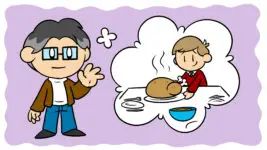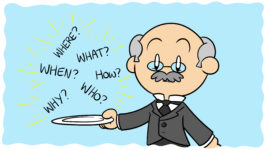Harlan Ellison was a giant of speculative fiction. The author of more than 1,800 stories, essays, and articles, dozens of teleplays and movie scripts, and winner of eight Hugo Awards, four Nebula Awards, five Bram Stoker Awards, and two World Fantasy Awards, among others, Ellison is remembered both for his own writing (including the short stories ‘I Have No Mouth, and I Must Scream’ and ‘“Repent, Harlequin!” Said the Ticktockman’) and for his editorial work on projects like the anthology collection Dangerous Visions, in which he set out to showcase the work of up-and-coming speculative fiction authors.
Hot-headed, outspoken, and litigious, Ellison was the source of a lot of advice in his lifetime, and so today we’ll be sifting through his thoughts and exploring what modern authors have to learn from this influential author.
1. Live an interesting life
Like many authors, Ellison lived a varied and exciting life. He first ran away from home at thirteen, claiming that by eighteen he had worked as a ‘tuna fisherman off the coast of Galveston, itinerant crop-picker down in New Orleans, hired gun for a wealthy neurotic, nitroglycerine truck driver in North Carolina, short-order cook, cab driver, lithographer, book salesman, floorwalker in a department store, door-to-door brush salesman, and as a youngster, an actor in several productions at the Cleveland Play House.’ He joined a gang to research his first novel, was expelled from Ohio State University for punching a teacher who denigrated his writing, and frequently wrote stories in bookstore windows to try and demystify the writing process (and drum up publicity.)
In short, Ellison was a walking example of how living an interesting and varied life will keep the fires of inspiration burning for a lifetime.
All my life has been an event. I don’t know at what point the persona separated from the body of work, but I think that, in fact, they didn’t. I think that it’s fairly obvious if you read the stuff I write, there is the same – well they used to accuse me of writing at the top of my lungs. … I bring the same passion, the same commitment, the same determination not to flinch and turn away from the abyss to my work that I do to my life.
– Harlan Ellison in ‘A Conversation With Harlan Ellison’ by Jayme Lynn Blaschke
2. Be stubborn
Ellison was famously litigious, refusing to accept the unauthorized proliferated of his work, even in the age of the internet, and especially unwilling to allow movie producers to adapt his work without paying for the privilege.
If you put your hand in my pocket, you’ll drag back six inches of bloody stump.
– Harlan Ellison in ‘Print Books Are Target of Pirates on the Web’ by Motoko Rich
In many areas of his life, Ellison showed an insistence on not working or living according to the whims of outside forces, and this is something he repeatedly brought into his art. When Robert Heinlein proposed his five rules for writers, rule three was ‘You must refrain from rewriting, except to editorial order.’ Even this wasn’t absolute enough for Ellison, who added the addendum, ‘And then only if you agree.’
Ellison insisted that authors should hold the line even against the gatekeepers of their chosen industry.
A lesson any writer can use. Don’t be afraid. That simple; don’t let them scare you. There’s nothing they can do to you. If they kick you out of films, do TV. If they kick you out of TV, write novels. If they won’t buy your novels, sell short stories. Can’t do that, then take a job as a bricklayer. A writer always writes. That’s what he’s for.
– Harlan Ellison, Dangerous Visions
In fact, Ellison’s outlook even applied to his audience…
3. Stretch yourself
You’d be forgiven for thinking that while Ellison certainly didn’t fear the people publishing his work, he saved his real disregard for the people reading it. After all, he’s the author who once said, ‘Well, I came to understand at a very primal level a long, long time ago that one must not only ignore your audience, you must despise them.’ Oof!
But Ellison later explained his comments, making it clear that he didn’t bear any ill will towards his readers, he just believed that authors should focus on stretching their own abilities rather than on writing what the audience demands.
I think you can’t hit a moving target. As a writer, I don’t want to be in the same place twice. I don’t want to chew my cud. I don’t want to have to spit out and regurgitate the same stuff again. I always try to keep ahead of my own abilities as good or as bad as they are, and I find this annoys my audience. I did “Repent Harlequin, Said the Ticktock Man,” of which everybody at the time said, “Oh, nobody’s going to like this.” Well, it won the Hugo and was the first short story ever to win a Nebula. So then I did “I Have No Mouth And I Must Scream” and everybody panned it. They said, “Oh no, this is not nearly as good as ‘Repent, Harlequin,’” which they had said was shit to begin with, right? All of the sudden “Repent, Harlequin” was a classic, so now “I Have No Mouth and I Must Scream” was terrible. Well, when “I Have No Mouth and I Must Scream” won the Hugo, all of the sudden it became the icon. If you listen to your audience, you will first go crazy as a soup sandwich, and you will always wind up doing something other than what your muse orders you to.
– Harlan Ellison in ‘A Conversation With Harlan Ellison’ by Jayme Lynn Blaschke
The idea, then, isn’t that you need to hate the people who love your work, but that your duty as a writer is to pursue your own goals and development regardless of what you’re told.
4. Do the work
Asked how he became a writer, Ellison replied, ‘I always was. I came out of the womb a writer. I didn’t realize that everybody couldn’t write. Writing was my natural form. I didn’t become a writer, I was a writer.’
This is the view held by a great many successful writers – that the compulsion to express yourself through writing exists on a level you can’t control. Here, there is no choice to become a writer, just the decision to be a productive writer and to improve your craft to the point that your compulsion is of value to others.
And when I stopped at some point – and I’ve done this on numerous occasions – and said, “Why? Why am I doing it?” I am reminded of the quote from Heinrich von Kleist, who said, “I don’t stop writing, because I cannot.” And it is a compulsion. It’s like breathing.
– Harlan Ellison in ‘Q&A: Harlan Ellison’ by Damien Walter
Ellison objected to the idea that he was a ‘prolific’ writer, arguing instead that it was simply his full-time job, but he still understood that reaching that point involves a commitment to producing finished work.
The trick is not becoming a writer. The trick is staying a writer. Day after month after year after story after book. That’s the secret. And if you can do that and produce a body of work, no matter how large or small it is, that is true and can pull the plow, then you’re a writer. If you are not prepared to spend your life doing that, then, for christsake, don’t do it.
– Harlan Ellison in ‘A Conversation With Harlan Ellison’ by Jayme Lynn Blaschke
5. Get paid
In much of his advice, Ellison rages against any attempt to put constraints on writers, and his insistence on being paid (and credited) for his work is an extension of this. It’s therefore important to acknowledge that Ellison didn’t believe that producing art was just a way of getting paid. To the contrary, he frequently advised authors to take up other forms of work on which to live.
Get a day job, make your money from that, and write to please yourself.
– Harlan Ellison in ‘ATW Inteviews’
But when you are writing for money, Ellison insists that you get paid. Now, Ellison’s outlook was forged in a time when the short-story market was booming and the everything-for-free internet wasn’t a factor, but it’s still worth modern-day authors absorbing a little of his zeal on this subject.
They always want the writer to work for nothing. And the problem is that there’s too goddamned many writers who have no idea that they’re supposed to be paid every time they do something. They do it for nothing!
– Harlan Ellison in ‘Dreams with Sharp Teeth’
They have the money to buy drugs, they have money to go to the movies, they have money to buy themselves new shoes, but they don’t have the money to pay the writer. … I think any writer who gives away his work demeans himself, demeans the craft, demeans the art, and demeans the buyer. It is not only caveat emptor, it is caveat lector. I don’t mean to be crude when I say this, but I won’t take a piss unless I’m paid properly.
– Harlan Ellison in ‘Q&A: Harlan Ellison’ by Damien Walter
Strong words, and a dagger through the heart of any writer trying to make it in the ‘content-driven,’ ‘do it for the exposure,’ ‘give the first two away for free’ world of online publication. I won’t pretend that Ellison meant anything different to the very clear, very literal points he makes, but in a new world, it’s worth asking what ‘getting paid’ looks like in 2020.
Ellison would say it looks like money, and at a certain level that’s true, but for amateur authors just starting out, it’s worth recontextualizing Ellison’s insistence on getting his fair share as applying to more than moolah. If you’re writing for someone, even just an audience, it’s worth understanding beforehand what you hope to gain from doing so and what you’ll do if you don’t get it. If you are, as Ellison rails against, working for the exposure, there’s a difference between accepting that ‘some’ people will see your work and understanding how large of an audience you’re actually trying to reach. Nail down the specifics – that your name appear on the work, that it include a bio and a link to your other writing, that you retain the right to use it elsewhere.
In a world where writing has been devalued enough that monetary payment may be out of the question for amateurs, there are other currencies to treat seriously. Be as dogged about the ephemeral rewards you’re chasing as Ellison was about writing, and remember that even more than in the past, there’s always somewhere else to write.
Writer from tomorrow
Those are some of the best pieces of advice offered by one of the most experimental, most inspired speculative fiction authors ever to sit at a typewriter. What do you think of Harlan Ellison’s advice, and how will you apply it to your own writing? Let me know in the comments, and check out Why You Need To Take Yourself Seriously As An Author and The Sneaky Problem That May Be Undermining Your Success for more great advice on subjects close to Ellison’s heart.






1 thought on “5 Ways Harlan Ellison Can Help You Improve Your Writing”
Outstanding Mr. Wood. I just discovered this blog today and I have it now in my feed reader. Cheers.